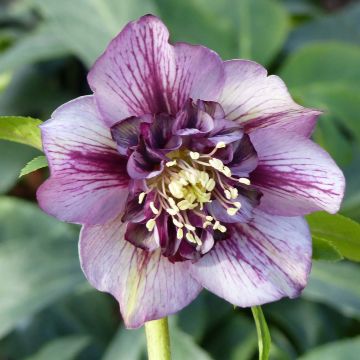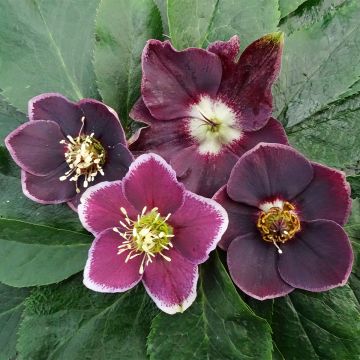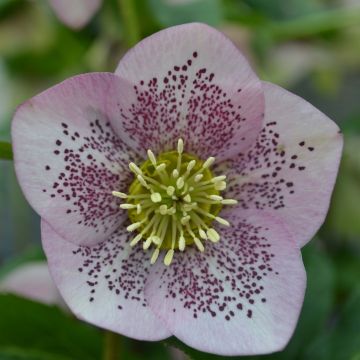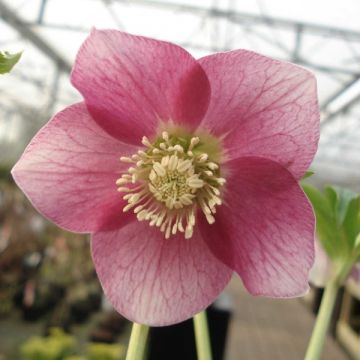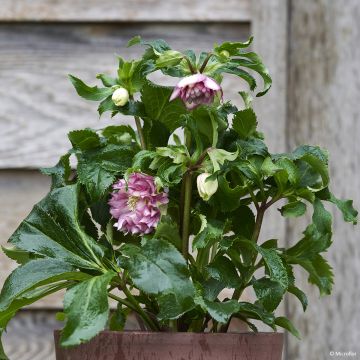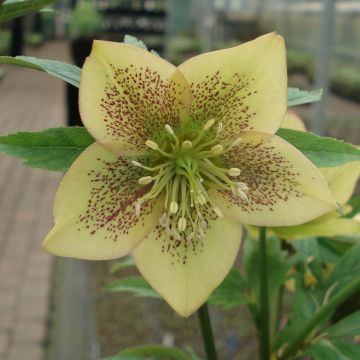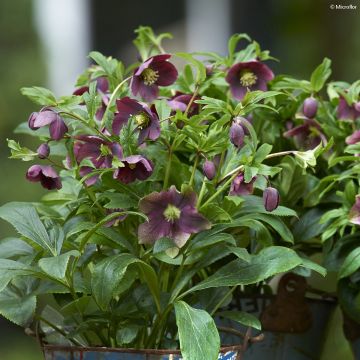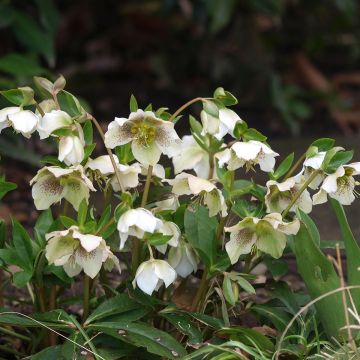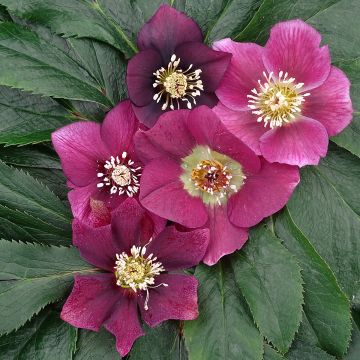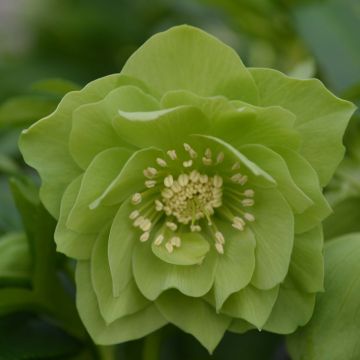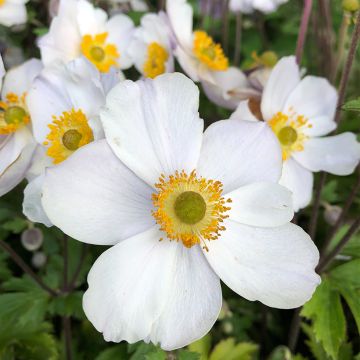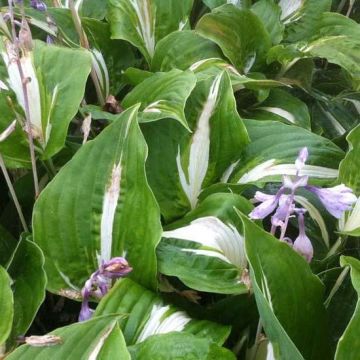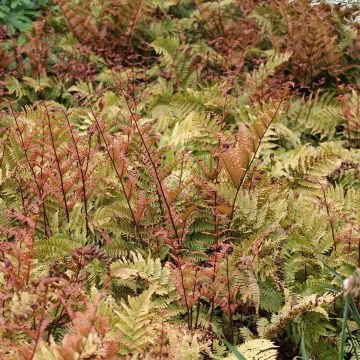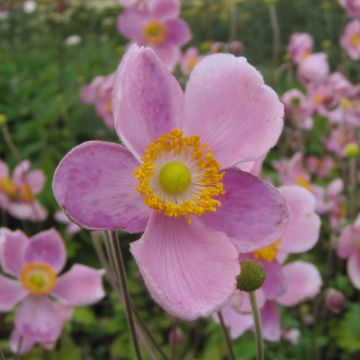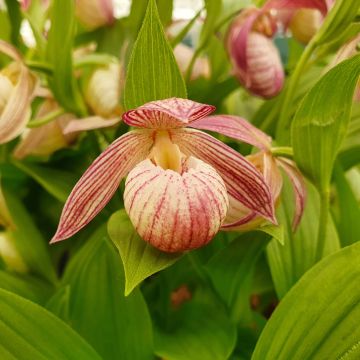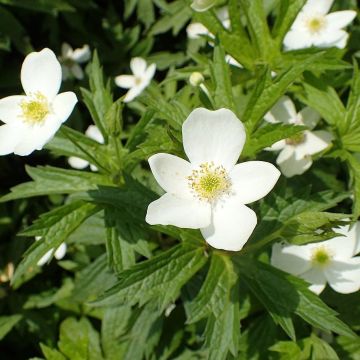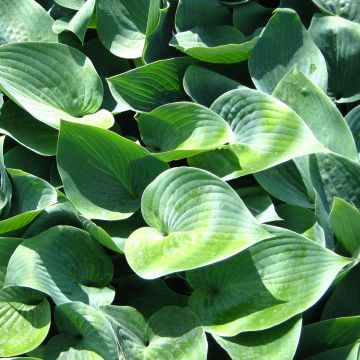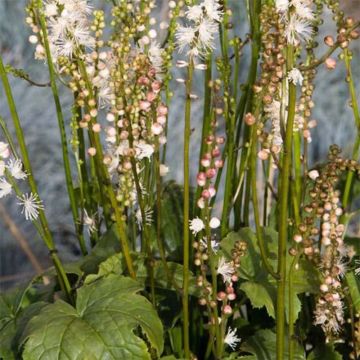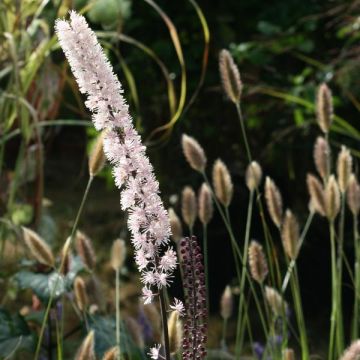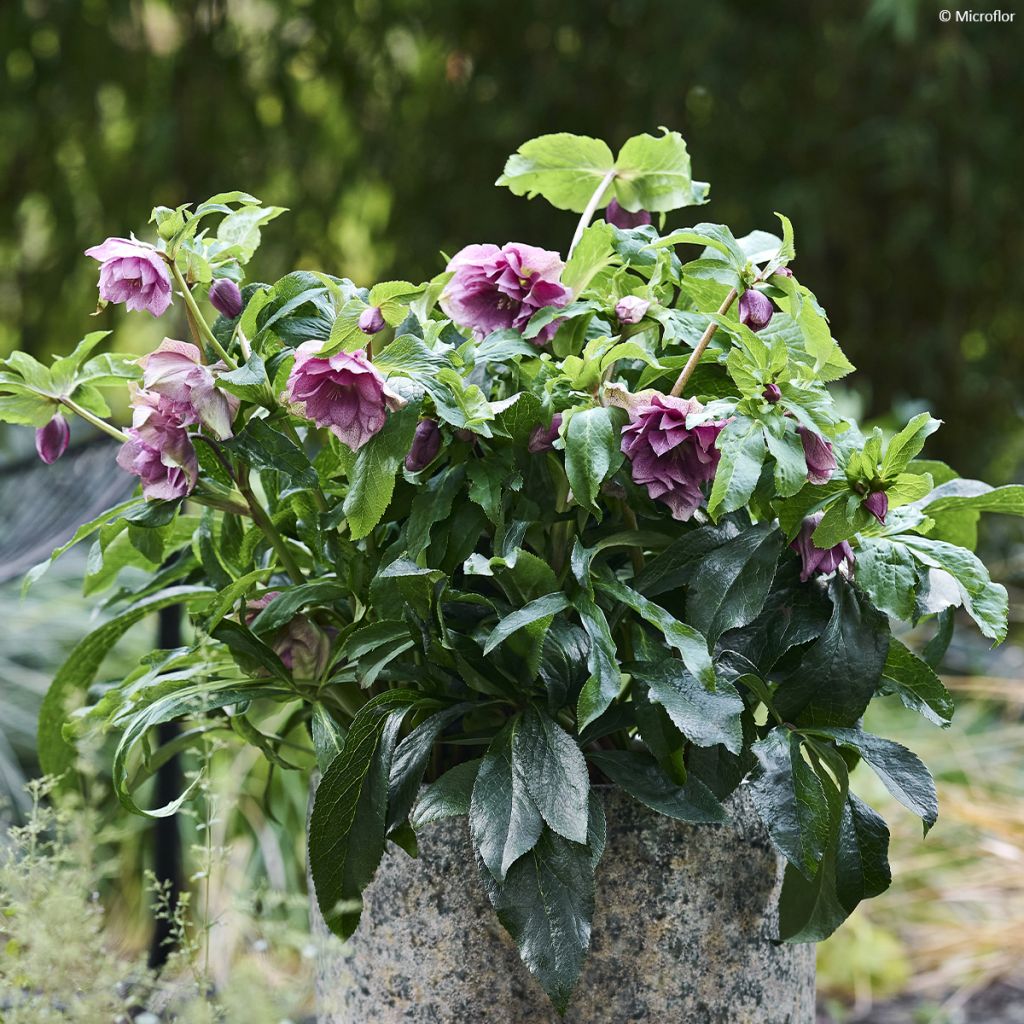

Helleborus hybridus ViV Laura
Helleborus hybridus ViV Laura
Helleborus x hybridus ViV® Laura
Lenten Rose, Oriental Hellebore
This item cannot be shipped to the selected country
Delivery charge from €5.90
More information
Schedule delivery date,
and select date in basket
This plant carries a 12 months recovery warranty
More information
We guarantee the quality of our plants for a full growing cycle, and will replace at our expense any plant that fails to recover under normal climatic and planting conditions.
From €5.90 for pickup delivery and €6.90 for home delivery
Express home delivery from €8.90.
Does this plant fit my garden?
Set up your Plantfit profile →
Description
Helleborus x hybridus ViV Laura is a variety of the excellent ViV series with a particularly stout and compact habit. This hellebore produces double light purple flowers, speckled with darker spots, at the end of the year. A bunch of yellow stamens burst from the centre, forming a happy contrast with the petals. Its decorative, dark green evergreen foliage, forms a very compact clump both in pots and open ground. This hardy hellebore needs a shaded position and humus-rich soil to thrive.
The Hellebores of the ViV® series are varieties resulting from in-vitro multiplication. Unlike varieties resulting from seed, hellebores produced by in-vitro guarantee flowering that is rigorously identical to the variety from which they originate. They have the same genetic characteristics as the mother plant, are more vigorous, and develop uniformly.
Helleborus x hybridus ViV Laura belongs to the Ranunculaceae family, which includes about sixty genera and around 2500 species, mostly herbaceous. Helleborus orientalis is native to Greece, Turkey, and the central and eastern Caucasus. It is a perennial plant that hybridizes very easily with other species, resulting in hybrids with varied colours and forms. These hybrids are rarely given variety names. Oriental Hellebore is a hardy plant that can withstand temperatures as low as -15°C (5°F), naturally growing in forests, thickets, and clearings up to 2,000 m (2,187 yards) in altitude.
Laura is a beautiful example, forming a very dense and compact clump, 35 to 45 cm (14 to 18in) tall and almost as wide. It consists of palmate, slightly toothed, dark green and shiny basal leaves, decorative all year round. These are evergreen but actually live for only 8 months and are regularly replaced by new leaves. Laura mainly blooms in November and December, but can extend a little more into winter depending on the season. Its flowers have a romantic charm, resembling old roses or peonies. Formed of several rows of light purple, layered petals with a slightly wrinkled appearance, enhanced by multiple small dark purple dots. A bunch of yellow stamens emanating from the centre adds a contrasting colour. The flowers are slightly inclined downwards to allow rainwater to drain, otherwise, the heart coul rot. Hellebores do not like to be moved once established, and young plants sometimes take time to flower, so choose a location carefully. The seeds are sown by ants.
How can you resist Hellebores, and Laura in particular? Its flowers, 5 or 6 cm (2in) in diameter, are highlighted by the dark foliage and will look great in a romantic border, in partial shade, on the edge of tall shrubs or trees. To enliven spring, plant a Bleeding Heart alongside them, like the unusual White Gold, with pleasantly cut yellow-golden foliage that contrasts with the dark green of the Hellebore, and brightens up the partial shade. Its white heart-shaped flowers will fit well. To celebrate summer, add Hydrangea paniculata Petite Star with a wider-than-tall compact shape, whose slightly old-fashioned charming flowers change from lemon green to cream white, then pink before turning red as autumn approaches.
Report an error about the product description
Flowering
Foliage
Plant habit
Botanical data
Helleborus
x hybridus
ViV® Laura
Ranunculaceae
Lenten Rose, Oriental Hellebore
Cultivar or hybrid
Other Oriental Hellebore
Planting and care
Helleborus x hybridus ViV Laura grows in any neutral to slightly chalky, even moderately acidic, rich, light or clayey soil, in partial or light shade, sheltered from cold and prevailing winds. Avoid direct sunlight during the hottest hours in the south. Plant from early autumn to spring, avoiding frost. It thrives in deeply worked soil mixed with organic matter. To feed, use bone meal or another organic fertilizer for the slow release of nitrogen. Water well after planting and add a layer of mulch 2 to 5 cm (1 to 2in) thick. Regularly remove faded leaves to improve flowering. Respect a planting distance of 30 to 40 cm (12 to 16in) between each plant to promote their development. Hellebore does not tolerate stagnant water as it may cause rotting.
The roots should not completely dry out in summer. Hellebores can be affected by a fungal disease transmitted by aphids, known as black spot. Remove any stained leaves from this evergreen species when the flower buds appear. Remove faded flowers after seeding. They may also suffer from grey rot or die from collar rot due to poor growing conditions, in excessively moist situations.
On a balcony or terrace, plant this perennial in a pot 4 to 5 times larger than it, as it needs space to develop its root system. This Hellebore can withstand temperatures down to -15°C or even lower, allowing it to adapt to almost all regions.
Planting period
Intended location
Care
This item has not been reviewed yet - be the first to leave a review about it.
Shade-loving perennials
Haven't found what you were looking for?
Hardiness is the lowest winter temperature a plant can endure without suffering serious damage or even dying. However, hardiness is affected by location (a sheltered area, such as a patio), protection (winter cover) and soil type (hardiness is improved by well-drained soil).

Photo Sharing Terms & Conditions
In order to encourage gardeners to interact and share their experiences, Promesse de fleurs offers various media enabling content to be uploaded onto its Site - in particular via the ‘Photo sharing’ module.
The User agrees to refrain from:
- Posting any content that is illegal, prejudicial, insulting, racist, inciteful to hatred, revisionist, contrary to public decency, that infringes on privacy or on the privacy rights of third parties, in particular the publicity rights of persons and goods, intellectual property rights, or the right to privacy.
- Submitting content on behalf of a third party;
- Impersonate the identity of a third party and/or publish any personal information about a third party;
In general, the User undertakes to refrain from any unethical behaviour.
All Content (in particular text, comments, files, images, photos, videos, creative works, etc.), which may be subject to property or intellectual property rights, image or other private rights, shall remain the property of the User, subject to the limited rights granted by the terms of the licence granted by Promesse de fleurs as stated below. Users are at liberty to publish or not to publish such Content on the Site, notably via the ‘Photo Sharing’ facility, and accept that this Content shall be made public and freely accessible, notably on the Internet.
Users further acknowledge, undertake to have ,and guarantee that they hold all necessary rights and permissions to publish such material on the Site, in particular with regard to the legislation in force pertaining to any privacy, property, intellectual property, image, or contractual rights, or rights of any other nature. By publishing such Content on the Site, Users acknowledge accepting full liability as publishers of the Content within the meaning of the law, and grant Promesse de fleurs, free of charge, an inclusive, worldwide licence for the said Content for the entire duration of its publication, including all reproduction, representation, up/downloading, displaying, performing, transmission, and storage rights.
Users also grant permission for their name to be linked to the Content and accept that this link may not always be made available.
By engaging in posting material, Users consent to their Content becoming automatically accessible on the Internet, in particular on other sites and/or blogs and/or web pages of the Promesse de fleurs site, including in particular social pages and the Promesse de fleurs catalogue.
Users may secure the removal of entrusted content free of charge by issuing a simple request via our contact form.
The flowering period indicated on our website applies to countries and regions located in USDA zone 8 (France, the United Kingdom, Ireland, the Netherlands, etc.)
It will vary according to where you live:
- In zones 9 to 10 (Italy, Spain, Greece, etc.), flowering will occur about 2 to 4 weeks earlier.
- In zones 6 to 7 (Germany, Poland, Slovenia, and lower mountainous regions), flowering will be delayed by 2 to 3 weeks.
- In zone 5 (Central Europe, Scandinavia), blooming will be delayed by 3 to 5 weeks.
In temperate climates, pruning of spring-flowering shrubs (forsythia, spireas, etc.) should be done just after flowering.
Pruning of summer-flowering shrubs (Indian Lilac, Perovskia, etc.) can be done in winter or spring.
In cold regions as well as with frost-sensitive plants, avoid pruning too early when severe frosts may still occur.
The planting period indicated on our website applies to countries and regions located in USDA zone 8 (France, United Kingdom, Ireland, Netherlands).
It will vary according to where you live:
- In Mediterranean zones (Marseille, Madrid, Milan, etc.), autumn and winter are the best planting periods.
- In continental zones (Strasbourg, Munich, Vienna, etc.), delay planting by 2 to 3 weeks in spring and bring it forward by 2 to 4 weeks in autumn.
- In mountainous regions (the Alps, Pyrenees, Carpathians, etc.), it is best to plant in late spring (May-June) or late summer (August-September).
The harvesting period indicated on our website applies to countries and regions in USDA zone 8 (France, England, Ireland, the Netherlands).
In colder areas (Scandinavia, Poland, Austria...) fruit and vegetable harvests are likely to be delayed by 3-4 weeks.
In warmer areas (Italy, Spain, Greece, etc.), harvesting will probably take place earlier, depending on weather conditions.
The sowing periods indicated on our website apply to countries and regions within USDA Zone 8 (France, UK, Ireland, Netherlands).
In colder areas (Scandinavia, Poland, Austria...), delay any outdoor sowing by 3-4 weeks, or sow under glass.
In warmer climes (Italy, Spain, Greece, etc.), bring outdoor sowing forward by a few weeks.

































